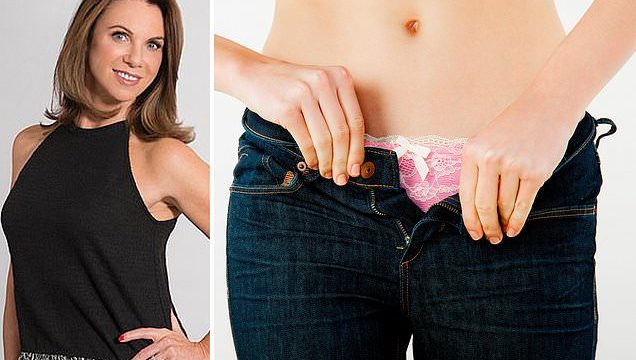How to keep YOUR vagina healthy: From ‘sexercise’ to loose clothing, Tracey Cox reveals everything you need to know (and the fads to avoid!)
- Tracey Cox reveals how often women should masturbate and the best sex moves
- The British sex and relationship expert also writes about the fads not to fall for
- She unveils the ‘sexercise’ that makes all the difference in her health guide
Between periods, hormone changes and childbirth, our poor vaginas cop a lot.
With the first vagina spa clinic launching in London soon, they’re also a hot topic.
The clinic will be offering expensive and dubious practises including a 24K gold ‘vajacial’ (gold infused waxing and LED light treatment), ‘O-shots’ (having your own blood platelets injected into your vaginal tissue) and vaginal steaming.
Should we all be booking appointments?
In my opinion, no.
Most of the these ‘treatments’ have been mocked by gynaecologists world-wide and have little or no evidence to back them up.
Not only that, it’s yet another pressure on women to make even our hidden bits look a certain way.
You don’t need expensive spa visits to stay in good shape. Here’s all you need to know to have a happy, healthy vagina – naturally.
Tracey Cox reveals how often women should masturbate and the best sex moves in her health guide (stock photo)
THE SEXERCISE
Pelvic floor exercises don’t just produce a tight vagina, they increase sensitivity, boost sexual desire, intensify orgasm and can help you become multi-orgasmic. They also help reduce strain on your pelvic organs and improve bladder and bowel function.
Plenty of reasons to get squeezing!
First, find your PC muscle by stopping yourself peeing (try not to pull in your bottom or tummy at the same time).
Once you’ve isolated it, squeeze and contract, holding it for a few seconds, then release.
Tracey Cox (pictured) also writes about the fads not to fall for
Start with repetitions of 25 and do two sets a day. It’s then a case of working up to around 50 repetitions, several times a day, but holding the squeeze for longer.
That’s your basic exercise but if you really want to make a difference fast, try this routine.
- Lie down or sit on the edge of the bed or chair and insert two fingers inside your vagina, up to your second knuckle.
- Squeeze your PC muscle around your fingers. Hopefully, you’ll feel your vagina contract around your fingers. (If you don’t, do a week or two of basic kegel exercises to get them in shape.)
- Spread your fingers apart to make a peace sign but keep them relaxed. Now contract your muscles and try to bring your fingers together, using just the muscle.
- Try contracting and holding for 10 seconds, then relax for 10. Aim to do 10 repetitions, twice a day.
FADS NOT TO FALL FOR
There are many out there, willing you to part with your hard-earned cash! Few – if any – are worth it.
Vaginal glitter bombs
‘Passion Dust’ is a new product that’s supposed to help ‘manage’ vaginal discharge and make it taste sweet.
It’s a capsule filled with gelatin, edible glitter (made from sugar) and other ingredients, to be inserted into the vagina at least one hour before having sex.
Needless to say, it’s not approved by the FDA and few gynaecologists recommend it.
Bad bacteria feed off sugar and the little flakes of plastic can produce inflammatory masses on your vaginal wall.
Oak galls
Oak galls are small, ball-shaped tree growths that form when a certain kind of wasp pierces oak trees to deposit larvae.
Some believe that when they’re ground into a paste, they help strengthen and tighten the vagina.
Consequently, new mums are buying them online and either crushing them and putting them in their vaginas or taking them in capsule form.
Sounds bonkers…and it is.
All they do is dry out the vagina by removing the protective mucous layer, making sex painful.
Jade eggs
Goop’s infamous Yoni Egg cost the company $145,000.
Gwyneth’s website claimed inserting a jade egg would increase orgasms, improve vaginal muscle tone, hormonal balance and ‘feminine energy’ in general.
Scientists begged to differ, saying none of the claims were supported by competent and reliable science.
There’s also no evidence that inserting jade eggs is a ‘secret, ancient practise’.
Vaginal piercing
Some women pierce their clitoris, inner or outer labia because they like the look of it or think it helps to stimulate the clitoris during sex.
It’s not a complete no-no if you go to an approved, safe clinic but more often than not, piercings cause a loss of sensation and infections.
Tracey says: ‘Have sex regularly. The vagina is a closed muscular canal. Like the other muscles in our body, it needs exercise,’ (stock photo)
THINGS THAT ARE WORTH A TRY
Pelvic floor monitors or training kits
THINGS YOU SHOULD NEVER INSERT
Chocolate syrup: Anything that has sugar in it changes the bacteria and yeast proportions that cause infections.
Whipped cream: Fine to have it licked off your nipples, buttocks and thighs but don’t put it inside the vagina.
Petroleum jelly (Vaseline) or baby oil: Again, it alters the pH balance and often leads to yeast infections.
Vegetables: The main problem is pesticides. So, if that carrot does catch your eye, you must wash it thoroughly first.
You also want to make sure whatever you put in, you can take out again. Things like peeled bananas are a problem because they’re difficult to remove.
An electric toothbrush: Use it on your clitoris if the vibration appeals but don’t put it inside. The vaginal tissue is delicate and the brush can cause tiny tears.
Spicy food: Why you’d want to insert a hot, red chilli is beyond me but just in case the idea appeals…Don’t. Hot foods irritate and can burn the vaginal tissue.
Kegel exercises get high tech with silicone trackers you insert into the vagina to measure the strength of your squeeze and chart progress.
This is something gynaecologists ARE happy to recommend.
Kegel ‘training kits’ include weighted kegel balls that you insert inside the vagina and squeeze around, ensuring you’re doing the exercises correctly.
(Lots of women think they’re squeezing their pelvic floor but are actually squeezing their buttock and thigh muscles.)
You progress to heavier weights, as you move through the program, building pelvic floor strength as you go.
Period ‘cups’
These are an alternative to tampons and pads.
Made from soft material, you insert them inside the vagina to collect menstrual flow, emptying up a few times a day.
They’re perfectly safe to use, reusable and lots of women swear by them.
A good ‘green’ choice – and way cheaper than constantly forking out for tampons or pads.
While we’re on the topic of insertion, a word on what is and isn’t safe to put inside.
THE SEX MOVES
How, when and how often you have sex strongly influences what shape your vagina is in.
Pee before and after sex to flush out bacteria
Especially if you’re prone to cystitis.
Have sex regularly
The vagina is a closed muscular canal that extends from the vulva (the outside of the female genitals) to the neck of the uterus (cervix). Like the other muscles in our body, it needs exercise. Having sex – at least once a week – will keep your muscles toned and the vaginal walls flexible. If you don’t have a partner, masturbate a few times a week – to orgasm – to reap the same health benefits. Use a variety of masturbation techniques (fingers, vibrator) so you don’t become dependent on one type of stimulation.
Use a good quality lubricant
Vaginal dryness is the prime cause of painful sex and using lube helps to protect the delicate walls of the vagina from tiny cuts and tears. Vaginal moisturisers are different from lube: you apply at night time. If you’re been through the menopause, oestrogen pessaries, that you insert into the vagina, can make the world of difference.
Use condoms
If you’ve had unprotected sex, you are at risk of having a sexually transmitted infection. Signs include a vaginal discharge, warts, ulcers or sores but lots of infections are symptom free. See your doctor or do an at home STI check if you think you’re at risk. If you’re in a monogamous relationship, both get tested before ditching the condoms.
Never have anal sex then vaginal sex
Change the condom or thoroughly clean his penis first. Bacteria from your anus does not belong in the vagina and ups the risk of infections.
Keep your sex toys clean
Follow the instructions for your specific toy but you can wash most with warm, soapy water. Clean after every use,
Don’t have penetrative sex until your vagina ‘tents’
Foreplay isn’t a luxury, it’s a necessity. Unaroused, the average vagina is about three or four inches deep. Once you’re aroused, the muscular tension created draws the uterus upward into a tent shape, creating more space in the vagina lengthwise and making sex more comfortable.
Don’t expect to orgasm through penetration alone
Only 20 to 30 per cent of women can reach orgasm during intercourse without added clitoral stimulation. There’s nothing wrong with you, it’s biology. The clitoris is outside the vagina!
OTHER TIPS FOR A HAPPY, HEALTHY VAGINA
Here’s some basic rules that everyone with a vagina needs to follow:
Change tampons frequently and don’t use ‘deodorised’ tampons. Don’t leave tampons in overnight.
Wear 100 per cent cotton underwear – or none at all. The aim is to keep the vagina cool and ventilated and cotton lets air in and absorbs moisture. Avoid thong underwear if you’re sensitive.
SHOULD I STEAM MY VAGINA?
Gwyneth Paltrow would answer yes but the medical community give it a definite thumbs down.
Vaginal steaming (V-steaming, yoni steaming) isn’t new but it’s become quite the thing to do in some celebrity circles.
It involves directing herb-infused steam (mugwort, chamomile, calendula, basic, wormwood and oregano are the usual choices) into your vagina by sitting or squatting over it.
Vaginal ‘spas’ offer the treatment: you sit on a special seat which has a hole for steam to come through.
Devotees say it cleans the vagina and uterus, regulates menstruation and eases cramps and bloating. There are also claims that it relieves stress, depression, infertility, hormone imbalances and infections.
Here’s the actual health benefits: none.
The vagina doesn’t need steam cleaning, it cleans itself.
There is no scientific evidence whatsoever to suggest that vaginal steaming helps any condition.
Even if the herbs were medicinal (and there’s no evidence to suggest they are, either), the cervix is tightly closed, stopping the herbs from reaching your uterus.
There are also dangers.
Hot steam can burn the sensitive vaginal tissue and adding extra heat and herbs mucks with the delicate pH balance increasing the risk of yeast or bacterial infections.
If you’re pregnant, it could affect the growing fetus.
It might feel relaxing but that’s about it. Have a bath instead!
Don’t wear tight clothing. Those skinny jeans aren’t doing you any favours, neither are leggings in synthetic fabrics or pantyhose with nylon girdles. If you must, wear a cotton panty liner.
Don’t cycle or spin too frequently. Cycling is great for your general health but hard bike seats can cause genital numbness. Those padded cycle shorts are padded for a reason. Wear them.
Don’t use any type of ‘feminine’ spray, vaginal deodorant, scented oil, bubble bath, bath oil or talcum powder, scented wipes or perfumed soaps or washes. They all disrupt the balance of bacteria and irritate. A healthy vagina smells slightly acidic but not unpleasant. If yours doesn’t smell good, see your GP. It’s likely to be bacterial vaginosis which is easily treated with antibiotics.
Make sure your underwear is rinsed properly. Double rinse your knickers if you’re washing by hand. Laundry detergent can irritate. Don’t use fabric softeners for the same reason.
Wipe front to back after you’ve been to the loo. It stops bacteria from your bottom being transferred into the vagina.
Use a soap-free cleanser if you’re prone to UTI’s or thrush. Rinse thoroughly after washing. If you’re really sensitive, just rinse with warm water.
Exercise – it improves the blood flow essential for sexual arousal and to keep the vaginal lining elastic.
Stop smoking. It’s linked to cervical cancer.
Get screened. All women aged 25 to 64 should be screened for cervical cancer. Regular pap smears mean any abnormal changes are identified early on and can be treated.
Don’t take antibiotics unless you really need to. They increase the risk of a vaginal yeast infection because they kill off both good and bad bacteria which changes the flora (colony of healthy bacteria) in the vagina, encouraging yeast and other infections to grow.
If you need to take a course, take probiotics at the same time.
Other medications can also affect vaginal health. Antihistamines don’t just dry up your sinuses, anti-depressants decrease sexual desire, and the contraceptive pill also has side effects.
Visit traceycox.com for more information about sex and relationships from Tracey and to see her product ranges.
Source: Read Full Article



